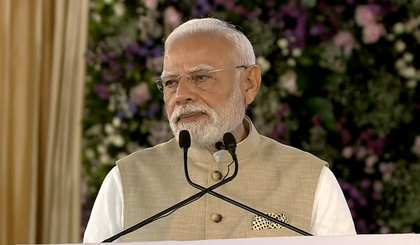India will become a hub of clean energy: PM Modi
By IANS | Updated: August 26, 2025 14:25 IST2025-08-26T14:19:51+5:302025-08-26T14:25:22+5:30
Ahmedabad, Aug 26 Prime Minister Narendra Modi on Tuesday inaugurated localised production of hybrid battery electrodes and flagged ...

India will become a hub of clean energy: PM Modi
Ahmedabad, Aug 26 Prime Minister Narendra Modi on Tuesday inaugurated localised production of hybrid battery electrodes and flagged off Battery Electric Vehicle (EV) exports to 100 countries from Hansalpur in Ahmedabad and stated that India will become a hub of clean energy.
Addressing the gathering, PM Modi emphasised India’s growing role in clean energy and electric mobility, while underlining the deepening partnership between India and Japan.
Highlighting India’s workforce and manufacturing potential, the Prime Minister said, “India has a demographic advantage, we have a skilled workforce. This makes it a win-win situation for any investment. Suzuki, Japan is manufacturing here and later cars are exported to Japan. This is the strength of Japan and India relations.
"This also shows the trust of global firms in India. Companies like Maruti Suzuki are brand ambassadors of India. It is our biggest car exporter. From today, we began to scale EVs at the same level. From now on, EVs that will roll in various countries will have ‘Made in India’ written on it.”
He pointed out that India had long been dependent on imports for EV batteries, but the situation was now changing.
“The most critical part of an EV is the battery. Earlier batteries were totally imported by India, but it was important to manufacture the battery in India and therefore we sowed the seeds of battery manufacturing in India. Three Japanese companies came together to manufacture battery cells and electrodes in India. This will give our mission new energy. This will boost the hybrid vehicle market of our nation.”
The Prime Minister also stressed that EVs were not just an alternative but a solution to multiple challenges.
“A few years ago, EVs were seen as an alternative but I think EVs are a solution to many problems. Last year during my Singapore visit, we decided to convert our old vehicles, old ambulances into EVs. Maruti Suzuki accepted that challenge and worked on it in six months. They built a hybrid ambulance. This will reduce pollution and also give an alternative to change old vehicles. Clean energy and clean mobility is our future. India will become a hub of clean energy.”
Citing India’s economic reforms and policies over the last decade, he said their impact was visible today.
“The policies that India made in the last decade are reaping benefits now. We started the 'Make in India' campaign, created a conducive environment for business, we are making industrial corridors, logistic parks… India is working in many sectors to give production linked benefit to manufacturers.
"We have solved issues of investors to make investments easy for them. The results are in front of us. Electric manufacturing has increased 500 per cent in a decade," he said.
Urging state governments to remain proactive, he said, “I have always told all states that we have to be proactive and have to give single window clearance. This is an age of competition. The state that keeps its policies neat and clean will raise the confidence of investors.
"Today the whole world is looking at India and so, every state should be competitive. This will benefit the nation. I invite all states to be competitive when it comes to pro-development policies.”
The Prime Minister also announced future plans in high-tech manufacturing and critical minerals. “India is not going to stop here. We have to perform better in the sectors we have already done well in. We are focussing on 'Mission Manufacturing'. We want to focus on semiconductors and six plants are going to be ready soon. We are aware about the shortage of Rare Earth magnets and therefore we have launched the 'National Critical Mineral Mission' in India. We will look for more critical minerals.”
The Prime Minister underlined the historical and cultural depth of India-Japan ties, calling the bilateral relationship one of trust and shared vision.
“India-Japan relation is more than just business, it is of history and culture. The journey that began with Maruti Suzuki is now going at bullet train speed. The roots of Japan-India relations are very strong,” he said.
Recalling his time as Gujarat Chief Minister, PM Modi said he paid attention to even small details to strengthen the partnership.
“The journey began from Gujarat, 20 years ago, from the Vibrant Gujarat summit. I even made my visiting card in Japanese. I even arranged Japanese food here for the guests, got golf courses made for them. Today, in many schools of India, there are teachers to teach Japanese language to students. People-to-people connect is huge between the countries.”
Concluding his address, the Prime Minister affirmed, “Japan-India relation is made for each other.”
Disclaimer: This post has been auto-published from an agency feed without any modifications to the text and has not been reviewed by an editor
Open in app